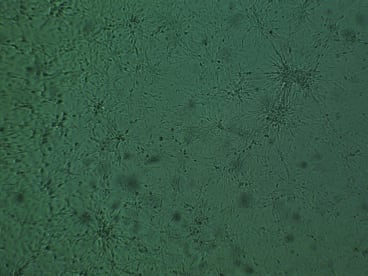KPC Cell Line (C57/BL6 genetic background)
Invented by Dr Jen Morton from Cancer Research UK Glasgow: The Beatson Institute
Invented at Cancer Research UK Glasgow: The Beatson Institute
- Datasheet
- References (4)
- Inventor Info
Info
| Catalogue Number | 153474 |
| Antigen/Gene or Protein Targets | Pdx1- Cre, lox-stop-lox-KrasG12D/+, lox-stop-lox-tp53R172H/+ |
| Synonyms | PDAC; Pdx1-Cre, LSL-KrasG12D/+, LSL-Trp53R172H/+, KC, PC, KPC,GTPase KRas, K-Ras 2, Ki-Ras, c-K-ras, c-Ki-ras, transformation related protein 53, insulin promoter factor 1; pancreatic and duodenal homeobox 1, transformation related protein 53, V-Ki-ras2 Kirsten rat sarcoma viral oncogene homolog, C-K-RAS, K-RAS; lox-stop-lox; LSL |
| Host | Mouse |
| Disease Keywords | Pancreatic cancer; pancreatic ductal adenocarcinoma |
| Model | Transgenic |
| Relevance |
Established cell line used as a model of pancreatic ductal adenocarcinoma. Background and Research Application The KPC mouse is an established and clinically relevant model of pancreatic ductal adenocarcinoma (PDA) which develops many key features observed in human PDA including pancreatic intraepithelial neoplasia alongside a robust inflammatory reaction including exclusion of effector T cells. Metastases are observed in around 80% of KPC animals located primarily in the liver and lungs. Mutations in both KRAS and TP53genes are found in around 80% and 70% of all human PDAs respectively. Tumours present in KPC mice display many immune-histological markers of PDA as well as possessing complex genomic rearrangements – a key sign of genomic instability. The co-morbidities, cachexia, jaundice and ascites, associated with human PDA are also observed in this model and most pancreatic tumours are resistant to chemotherapy. The KPC mouse contains a conditional point mutation in the transformation related protein 53 gene (TP53R172H), and a point mutation in the KRAS gene (KRASG12D) both of which generate non-functional proteins. A lox-stop-lox termination sequence is encoded upstream of both mutated genes to prevent expression in the absence of Cre recombinase. PDX1 (pancreatic and duodenal homeobox 1) is a transcription factor necessary for pancreatic development. The PDX1 promoter enables expression of Cre recombinase in acini, islet and duct cells of the pancreas. Cre-mediated recombination excises the two lox-stop-lox termination sequences and enables expression of both oncogenes: KRASG12D and TP53R172H in pancreatic tissue. Tissues not expressing Cre recombinase remain functionally heterozygous of the KRAS and TRP53 loci. |
| Production Details | Isolation of the cells: For each cell line, a 5mm diameter piece of tissue was harvested from solid PDAC arising in a C57BL/6 KPC mouse into DMEM. The tissue was chopped into a fine paste, resuspended in DMEM + L-Glut, Pen-Strep and 20% FBS, and plated out in a 25cm flask. The medium was changed after 2 days. Once confluent the cells were passaged as normal and grown in DMEM + L-Glut, Pen-Strep and 10% FBS in normoxic conditions at 37C in a humidified incubator. |
| Conditional | No |
| Research Area | Cancer, Drug Discovery & Development |
| Recommended Growing Conditions | Cells are loosely adherent but will need trypsinising. DMEM containing 10% foetal bovine serum and 2 mM l-glutamine at 37ºc with 5% CO² and air. A 1:2 split can be made every two days which is relatively standard. Incubated as standard. |
| Notes |
Points of Interest These cells are from mice backcrossed to F10 in C57/BL6. KPC Subtype: C57Bl6/J Concentration Vial has between 1-5 million cells as standard, however this may vary. |
References: 4 entries
Li et al. 2014. Gastroenterology. 146(5):1386-96.e1-17. PMID: 24462734.
Fascin is regulated by slug, promotes progression of pancreatic cancer in mice, and is associated with patient outcomes.
Europe PMC ID: 24462734
Hingorani et al. 2005. Cancer Cell. 7(5):469-83. PMID: 15894267.
Trp53R172H and KrasG12D cooperate to promote chromosomal instability and widely metastatic pancreatic ductal adenocarcinoma in mice.
Europe PMC ID: 15894267
Add a reference
References: 4 entries
Li et al. 2014. Gastroenterology. 146(5):1386-96.e1-17. PMID: 24462734.
Fascin is regulated by slug, promotes progression of pancreatic cancer in mice, and is associated with patient outcomes.
Hingorani et al. 2005. Cancer Cell. 7(5):469-83. PMID: 15894267.
Trp53R172H and KrasG12D cooperate to promote chromosomal instability and widely metastatic pancreatic ductal adenocarcinoma in mice.
Add a reference






